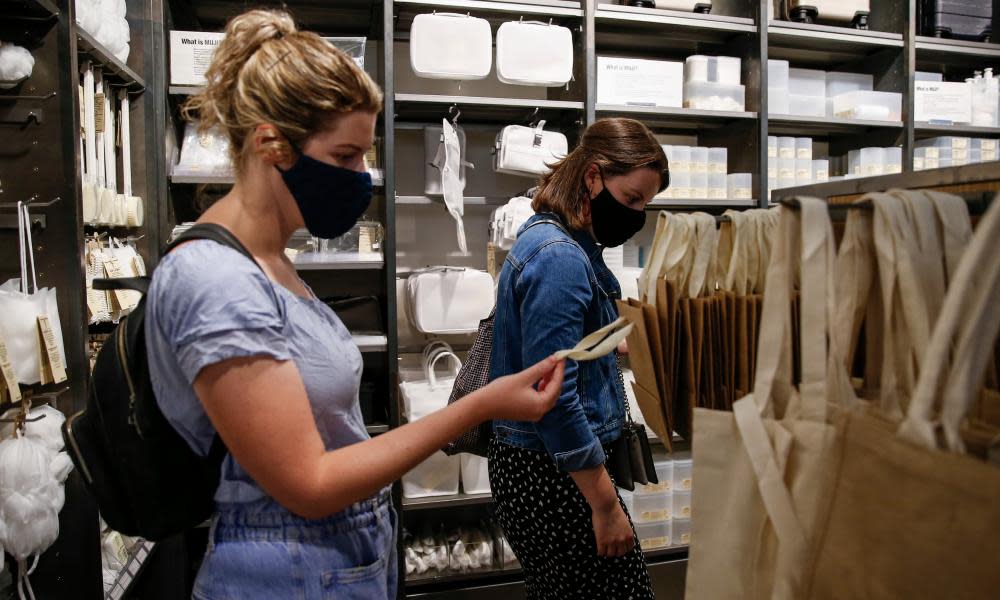The only real question about face masks is: what took England so long?

After going around in circles about the merits of face coverings for months, England has made them mandatory in shops from 24 July. Just like the delays and endless commentary in March and April about whether testing, tracing and isolating is important during a pandemic, whether travel restrictions can help prevent the importation of Covid-19 cases and whether lockdowns are necessary, the media and government have spent months prevaricating about face coverings before finally accepting that England has little choice but to follow others’ lead.
Related: Boris Johnson's mandatory mask policy has riled the Tory old guard | Katy Balls
The UK government has learned a painful lesson during the coronavirus pandemic: the most difficult thing about controlling outbreaks isn’t knowing what to do, but actually doing it. Take testing, for example. Already by early March the World Health Organization had made it clear that testing, tracing and isolating carriers of the virus was the best way to control outbreaks. In the words of its director general, Tedros Adhanom Ghebreyesus: “We have a simple message for all countries: test, test, test.” Yet it took England until the end of April to deliver on its testing target. Even now, we don’t know the true number of people who have been tested – as the government has stopped making this information publicly available.
Controlling outbreaks requires clear leadership that sets out a coherent strategy and compels advisers to shift from conversations about “what needs to be done” to “how best to achieve it”. By the time many other European countries had made face coverings compulsory, UK cabinet ministers seemed incapable of forming a consensus on the right response. On Friday, Boris Johnson hinted that a change in advice on face masks was coming – but Michael Gove then told Andrew Marr that wearing masks should be a matter of “basic good manners”.
Although we haven’t yet got the gold standard randomised control trial evidence about whether face coverings are effective at preventing the transmission of Covid-19, existing studies are convincing of their benefits. A study from the University of Edinburgh found that masks can limit how far exhaled breath travels out by as much as 90%. And one study from Germany noted that the daily growth rate of coronavirus infections fell by 40% after mask use was made compulsory in the city of Jena.
What observational studies such as these have made clear is that face coverings play an important role in protecting the wearer from infection, and preventing an infected wearer, if wearing a mask, from transmitting the virus. No one wants to see cases rise, or to have a second lockdown. The clear message should be: I wear a mask to protect you, and you wear a mask to protect me. The director general of the Chinese Centre for Disease Control and Prevention said the biggest mistake made in Europe and the US was that people didn’t wear masks from the start.
Making face coverings mandatory, rather than voluntary, is about reaching a “tipping point” where the majority of people start to comply with this guidance. If one person is wearing a mask in a shop and nobody else is, that one person feels out of place. The social norm then becomes not to wear a mask. But if the same person walks into a shop and everyone else is wearing a mask, they will feel awkward and uncomfortable not having one. Of course, some individuals, such as those who have breathing difficulties, won’t find it easy to wear a mask. We shouldn’t be shaming people for not wearing masks, as we don’t know the full circumstances.
As lockdown measures are eased, a careful balance must be maintained between reducing transmission of Covid-19 and supporting businesses and the economy by shopping, moving around cities on public transport, and getting back to daily life as much as possible. This virus spreads through droplets escaping from noses and mouths from speaking, coughing, sneezing and loud breathing. And these droplets can even become airborne, as the WHO has recently acknowledged. Masks can therefore play an important role in stopping droplets from infectious individuals reaching other people.
According to scientific studies, outdoor transmission seems minimal. The real challenge is to stop transmission within indoor settings, where individuals are in close contact with limited ventilation for a prolonged period of time, such as in shops, pubs and restaurants. Compounding this challenge is the role that presymptomatic and asymptomatic transmission – where an infected person spreads the virus before they develop symptoms themselves, or where they never develop symptoms – can play in spreading the disease. Relying only on those with symptoms of coronavirus to self-isolate is not enough to stop transmission given the role that these silent carriers play in its spread.
When the Scottish government made face coverings mandatory in shops from 10 July, the general reaction from the public was one of acceptance and relief – especially from people who work in shops and those who are anxious about becoming infected. Wearing a face covering while indoors, particularly when distancing may be difficult, seemed a small price to pay to avoid a second wave of coronavirus cases and reverse the progress made to contain the virus. Other countries, particularly some in Asia, will have been puzzled by why England took so long to make such a simple, low-cost decision.
• Prof Devi Sridhar is chair of global public health at the University of Edinburgh

 Yahoo News
Yahoo News 
